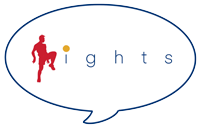Education to respect diversities is fundamental and can be developed through the knowledge of various cultures, not only through compliance with rules, and acceptance of equality. This requires the development of real intercultural and cross cultural skills ecosystems in grassroots clubs. Sport managers and coaches must increase their ability to face hate speech on the pitch, on the sidelines and on social media; club members and the fan communities must become more aware of the impact that hate speech can have on people and on the community.
Discover our OER
New coaching programs, based on knowledge, are necessary to improve skills and abilities to recognize, understand and respond to issues of hate speech, bullying, abuse, harassment and discrimination at grassroots sport clubs and at fans amateurs groups. There is a need to teach to grassroots sport coaches, managers, and fans clubs leaders how to deal and communicate with teens, parents, and fans. Indeed, it is recognized that one of the most common reasons coaches, managers, officials and athletes of all ages, cite for leaving sport is unacceptable parent behaviour and hate speech also among peers. Creating a respectful environment in and off the playground at grassroots level, is urgent as much it is imperative to develop athletes-centred approach to protect every single person from harassment and hate speech in sport.
“Coaches should be supported to explore their values and beliefs and to develop a personal, ethically grounded coaching philosophy over time. This will encourage coaches to develop the self-awareness required to discern whether their values and behaviours are aligned, and to do something about it when they are not.” (ref. European Coaching Framework. Coaches acquired skills to build positive and effective relationships with athletes and others stakeholders (personnel at the club, school, federation and other levels) taking part at specific programmes to become a sport coach. But, if on one hand the courses to become sport coaches include social skills, such as those necessary to create respectful and effective working relationships, the same are lacking in modules that specifically address the emerging social challenges that sport is often called upon to tackle starting from hate speech, intolerance and risk of youth radicalization.
Although, the theoretical coaching learning framework is mostly based on technical aspects and performances of athletes, in front of current wave of hatred, radicalization to violence, extremism and sovereignism spreading through various means and forms, Sport People needs to better understand their role in society, and have to be equipped with tools to improving their capacities to face challenges that contemporary society poses to communities and to the EU.
